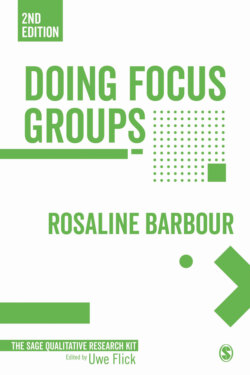Читать книгу Doing Focus Groups - Rosaline Barbour - Страница 24
На сайте Литреса книга снята с продажи.
Key points
ОглавлениеFocus groups can offer advantages in terms of accessing the ‘hard-to-reach’ and the ‘vulnerable’.
They can be useful in addressing ‘difficult’ or ‘sensitive’ topics.
Don’t use focus groups if you want to measure ‘attitudes’.
Give careful thought as to whether you are privileging research aims over participants’ concerns.
Consider the potential of using focus groups as part of an action-oriented approach.
Focus groups excel at providing insights into process rather than outcomes.
Fluidity of participants’ views should be seen – and used – as a resource rather than as a problem.
Be suitably cautious about making claims regarding the empowerment of focus group participants.
Further reading
The following texts provide a flavour of focus groups in practice:
Barbour, R.S. (2010) ‘Focus groups’, in I. Bourgeault, R. Dingwall and R. de Vries (eds), The SAGE Handbook of Qualitative Methods in Health Research. London: Sage, pp. 327–52.
Kitzinger, J. and Barbour, R.S. (1999) ‘Introduction: the challenge and promise of focus groups’, in R.S. Barbour and J. Kitzinger (eds), Developing Focus Group Research: Politics, Theory and Practice. London: Sage, pp. 1–20.
Puchta, C. and Potter, J. (2004) Focus Group Practice. London: Sage.
